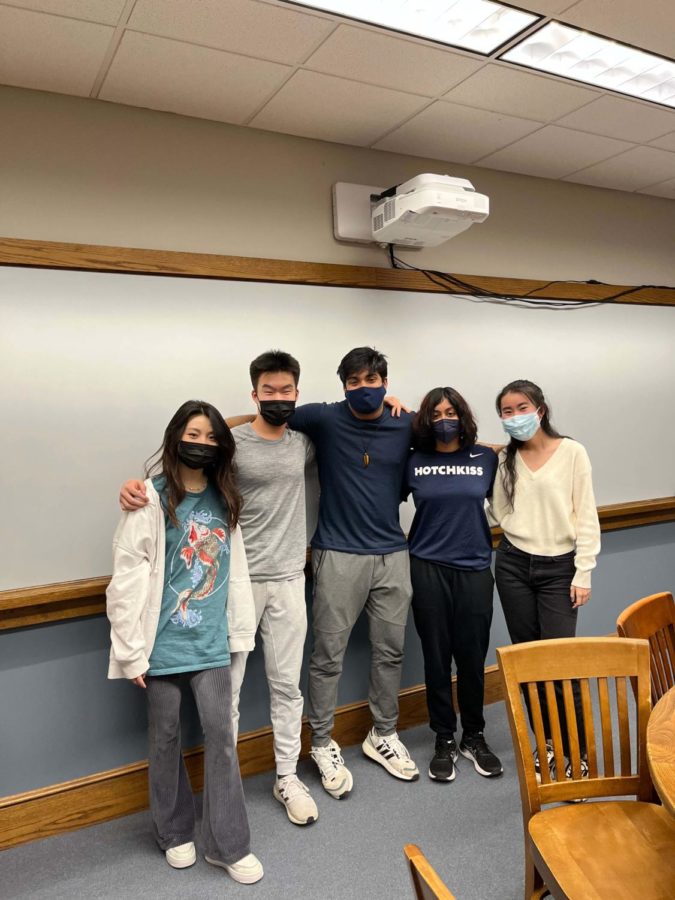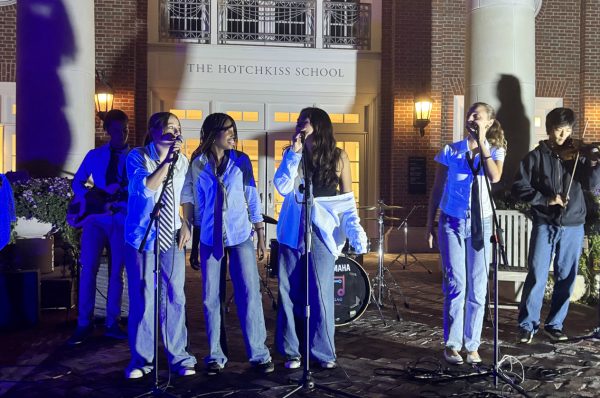Ethics Bowl Sweeps State
The Ethics Bowl team (pictured from left to right: Stella Ren ’22, Ben Who ’24, Rahul Kalavagunta ’22, Ishani Kalavagunta ’22, and Yixi Zou ’23) won the 2022 Connecticut High School Ethics Bowl Competition.
When the school’s Ethics Bowl team debuted last year, it struggled to win a single round.
Now, they’re state champions.
Competing against Choate on January 29 in the final round of the 2022 Connecticut High School Ethics Bowl Competition, the school grabbed a nail-biting victory, culminating a breakthrough year during which the team found its footing and established itself as a dominant opponent.
The win against Choate, whose team had taken the state championship for the past five years, capped a fierce day of competition against 14 teams from ten Connecticut schools. The school’s team, made up of Rahul Kalavagunta ’22, Stella Ren ’22, Maddie Lykouretzos ’23, Ben Who ’24, Yixi Zou ’25, and Ishani Kalavagunta ’25, emerged victorious—and undefeated, finishing the day with a 6-0 record.
But the achievement meant much more than just a title for the team, which had struggled to find much success last year. “We tried things that didn’t work out very well,” said Rahul Kalavagunta ‘22, co-captain of the team. “But we regrouped, put a lot of work in, and never stopped believing in our ability to win.”
Ethics Bowl is competed in rounds between two teams. The teams take turns presenting cases about the ethical aspects of real-life topics, such as ghosting, predictive policing, and journalistic integrity. After fielding questions from a panel of judges, who are usually philosophy professors, the teams are scored in various categories, such as clarity, depth of understanding, and acknowledgement of differing viewpoints.
The school’s team, coached by Dr. Thomas Fisher, instructor in philosophy, performed well in each of these categories and earned perfect scores from every judge for clarity and dialogue in the final round.
Co-captain Stella Ren ’22 attributed the team’s success to its extensive preparation and collaboration. Ren said, “The team spent countless hours discussing the intricacies of each case with one another, allowing us to form strong and unified presentations.”
Unlike in debate, the two schools in an Ethics Bowl round aren’t required to stand on opposite sides of an issue. This allows each team to develop their own argument and interact with the other side collaboratively rather than argumentatively.
“I’ve always been impressed with Ethics Bowl’s emphasis on collaborative inquiry,” said Dr. Fisher. “It’s a competitive event, yes, but I don’t know of any other competition where part of your score depends on how well you helped the other team improve their performance.”
Only in its second year of competition, the team now vies for a spot at Nationals during the regional playoffs against the Rhode Island champion, which will take place in the coming weeks.





